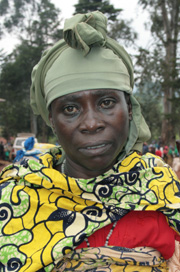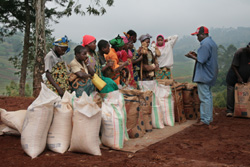
Photo: Jane Some/IRIN  |
| Janet Furaha is a 'pendulum' displaced person, moving between her farm and safer territory to elude attack |
BUKAVU, 1 August 2007 (IRIN) - Janet Furaha fled the violence in her home area of Kaniola in the Democratic Republic of Congo's (DRC) South Kivu province in May to live with relatives in Walungu, but she has often returned to tend her farm.
"I have not been there in the past few weeks because attackers have intensified their activities, but if I hear the situation is calmer, I will go and see if I can get any food," she said.
Furaha is one of the thousands of internally displaced persons (IDPs) in eastern Congo, who spend nights in areas they consider safer, such as settlements close to UN peacekeepers, but return to their home farms during the day.
Because of their constant movement, humanitarian workers have difficulties determining the exact number of IDPs and how to effectively deliver aid to them.
"When the latest displacement of civilians occurred in the Minembwe area of South Kivu, aid workers could not tell how many people had been displaced because they lacked access to the areas these people had fled to," Eusebe Hounsokou, the head of the UN High Commissioner for Refugees (UNHCR) office in DRC, said from the capital, Kinshasa, on 28 July.
"The nature of displacement is one of the major challenges we face. This 'pendulum displacement' means that often we cannot follow the movement of IDPs," Hounsokou said.
"The situation calls for the setting-up of mobile offices to deal with this kind of movement, and this is often difficult, especially in North Kivu where we have little access to at least nine IDP camps, mainly due to poor roads and continued lack of security," he added.
Waiting at an aid distribution centre supervised by the NGO Malteser International in Walungu district, south of Bukavu, Furaha explained: "I have eight children and food is my biggest worry." The centre feeds about 3,000 IDPs.
'Pendulum displacement'
The term 'pendulum displacement' was coined by aid workers in the region from the French description of the emerging pattern in IDP movements across eastern DRC - 'diplacements pendulaires'.
Such IDPs, aid workers say, move according to the clock. During the day, they are in their farms and homes going about their day-to-day activities. In the evening, they move to safer areas.
The pattern is not new. In northern Uganda, where the rebel Lord's Resistance Army has wreaked havoc for more than two decades, it is known as 'night commuting'. Children, afraid of abduction by the rebels, would trek several kilometres to urban areas every evening, to spend the night in the relative safety of the town, before making the journey back home the next morning.
The number of night commuters in northern Uganda has sharply decreased since peace talks between the government and the rebels began in Juba, Southern Sudan, in July 2006.
In eastern DRC, however, continuing 'pendulum displacement' has made monitoring difficult. Aid workers say even when IDPs seek refuge in urban areas such as Bukavu, the capital of South Kivu, and Goma, the capital of North Kivu, those who stay with relatives and friends cannot be reached.
Risks of receiving aid
Matters have been made worse by the risk the IDPs face after receiving aid. Often they are targeted afresh by armed attackers because they have precious food or other goods in their possession.
"To get round this, we often appeal to MONUC [the UN peacekeeping mission in the DRC] to set up mobile operation bases near the IDPs and to remain there a while longer after the distribution; until the IDPs have made use of the aid that has been given," Hounsokou said. "Otherwise they could end up losing it all."
Causes of displacement
According to the head of office of the UN Office for the Coordination of Humanitarian Affairs (OCHA) in Bukavu, Modibo Traore, the main cause of humanitarian problems in South Kivu is the continued presence of foreign armed groups.
"The government needs to urgently address the problem of the FDLR [Forces démocratiques de liberation du Rwanda] for the east to stabilise," Traore said.
"Military operations by FARDC [the national army] are another cause of displacement. For instance, in April, a FARDC battalion was sent on foot from North Kivu to South Kivu; it was total chaos all along the route they used," he added. "They were hungry, [and there was] no money, no logistical support. This led to the temporary displacement of civilians along this route. They returned to their homes after the battalion had passed."
Claude Mululu, the liaison officer in OCHA-Bukavu, said the number of IDPs in the province is estimated at 53,000, a figure that includes the "old caseload", a term for people displaced in conflicts dating back to 1996.
"All these people are displaced because of the security situation in their homes," Mululu said. "Cases of recent displacement have increased, especially since April, mostly due to the activities of the FDLR and Rasta [a group of bandits]."
He said access - due to poor roads and continuing insecurity - remained the main challenge facing humanitarian workers in the province.

Photo: Jane Some/IRIN  |
| An NGO official verifies details of a group of IDPs waiting to receive food aid at Cagala, Walungu district |
Moreover, Mululu said, whether people were listed as IDPs depended on whether they received aid from UN agencies and local and international non-governmental organisations (NGOs). This, he said, made it difficult to account for all IDPs. Mululu called this aid-dependent registration 'facteur de biais'.
"Those who receive aid are the ones who get registered; what becomes of those who did not register as displaced? Repeat displacement is another issue that makes follow-up of IDPs difficult; when a family moves to a place they consider safer, then ends up being displaced yet again from that area, it becomes difficult to track them."
Hopes for peace
During food distribution on 27 July at Cagala school in Walungu, most of the IDPs interviewed expressed their desire to see peace prevail in eastern Congo.
"With peace, we can go back to our homes instead of depending on food distributions such as this," Maroyi Sanganira, 38, said. "I would like to go back home, perhaps get help to buy a goat or a cow and to be able to take my children to school."
Ishingwa Chihyoka, the chief of Kaniola, who was at the distribution centre to help verify names of the beneficiaries, said most of those recently displaced had fled their homes after an incident on 27 June, when attackers killed 17 people and injured 23 others.
"Those who have returned to their homes do not sleep in the houses because it is too dangerous," he told IRIN. "People now move to their homes during the day then move to edges of the MONUC's Pakistani camp in Walungu to spend the night."
Among the most affected are women. According to the UN Special Rapporteur on Violence, Yakin Ertürk, who toured eastern Congo recently, violence against women in North and South Kivu included "unimaginable brutality".
"Armed groups attack local communities, loot, rape, kidnap women and children and make them work as sexual slaves," Ertürk said.
Js-ei/eo/sr/mw












